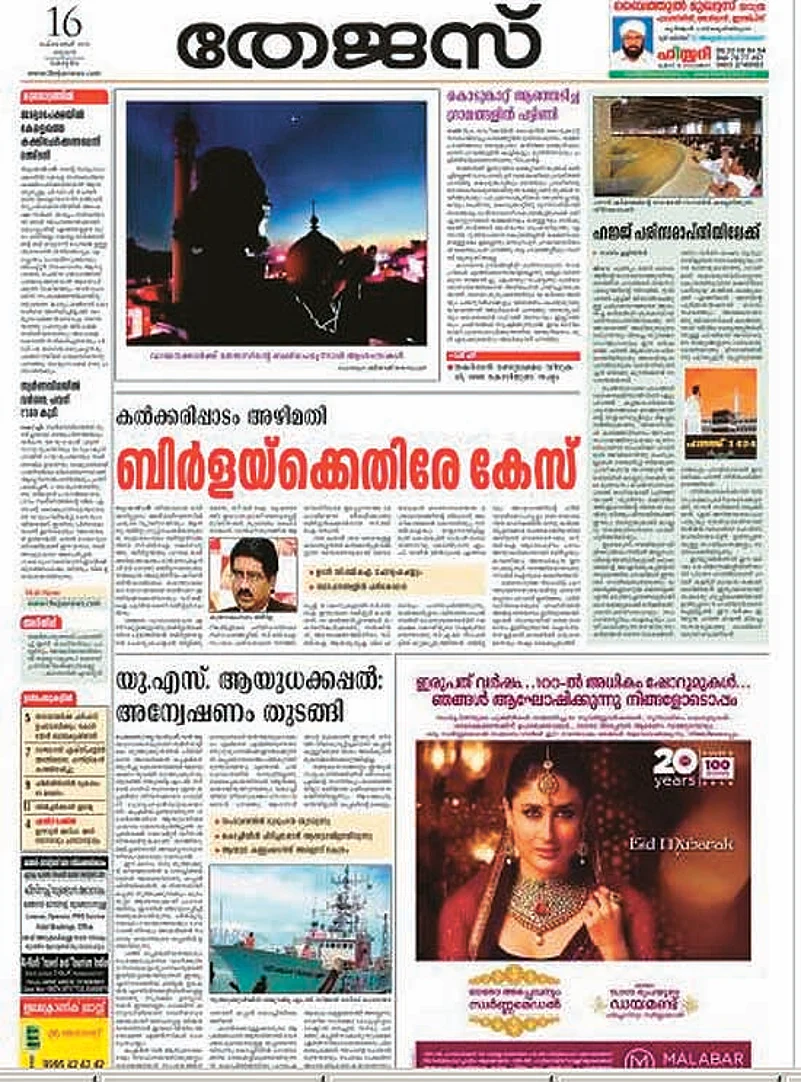Stone, Paper, Scissors
- State publicity department under LDF freezes ads in 2010
- Year later, UDF does the same; no reasons given
- Thejas is backed by the controversial PFI
- Political patronage is common in Kerala media. Janmabhoomi is owned by RSS, Deshabhimani by the CPI(M), and Chandrika by the Indian Union Muslim League
***
It’s no secret that it isn’t just corporates who wield influence over the media, governments, especially state governments, too exercise control by their powers to dole out public ads. So dependent are the small newspapers (those with a circulation of a lakh and less) on revenue from government ads that a threat of withdrawal usually translates into delayed salaries to the staff and other crises. State governments and the Centre have always used advertisements in its carrot and stick policy with the press.
A case that’s been taking up much media space in Kerala is that of Kozhikode-based daily Thejas. Veteran journalist and chief editor N.P. Chekkutty can’t understand why his paper has been singled out by the government and denied ads while many other dailies with political affiliations continue to get their share of government ad revenue. The paper has also been served showcause notices for actively working against the national security, unity and integrity of the country under the Press Registration of Books Act (PRB Act). Under the Act, a district magistrate is empowered to suspend the publication of a magazine/newspaper if it is found to have committed violations.
The newspaper, run by Inter Media Publishing Limited and owned by the Thejas Charitable Trust, has had run-INS with both the UDF and the LDF governments in Kerala—especially after the freeze on advertisements following intelligence inputs from the state and the Centre. A main reason for this is the trust chairperson E.M. Abdul Rahman, who also happens to be chairman of the Popular Front of India, a radical Muslim grouping which shot into the news four years ago after some of its members were arrested for chopping the arm of a university lecturer for allegedly insulting the Prophet in a term question paper. The pfi’s name has also come up in other such unsavoury cases, including some which were terror-related. The Front has courted controversies in the past, the newspaper is bearing the brunt for it, paying a price for the association (though it has never been offered as a reason officially for the freezing of ads).
Those who work in the paper, though, say the Front has never interfered with the paper’s editorial stand since its launch seven years ago. Editor Chekkutty says, “We give space to all organisations and when the attack on the academic took place, I condemned the heinous act in my column. Still, we were never given any reasons for the withdrawal of advertisements.” Could it have anything to do with the fact that the trust that runs the paper has over six members from the Front?
The first time the paper saw the drying up of advertisements was during the LDF reign in May 2010, when the government was going though one of its media blitzkriegs. Thejas was promised four pages of ads but found it withdrawn at the last minute. Chekkutty was told that intelligence inputs from the Union home ministry had cautioned the state’s publicity wing from advertising in the newspapers. “As a professional journalist, I can assure you that the Popular Front has never interfered in the editorial stand of the newspaper,” says Chekkutty. Then chief minister V.S. Achuthanandan promised to look into the matter. For sometime, the freeze was lifted. In May 2011, the UDF government led by Congressman Oommen Chandy was sworn in and the ads stopped again. They were lifted as mysteriously and for a year the paper got its share of advertisements.
Chekkutty says CM Chandy too had given assurances that the paper will not be discriminated against. Yet the daily suffered. In desperation and to clear the paper’s image, Chekkutty even met Union home minister Sushilkumar Shinde. He’d already done the rounds of the home ministers under the LDF and UDF government and officials from the publicity wing of the Government of India.
The paper says it is committed to three principles—to highlight and help alleviate the problems of the minorities, backward classes and Dalits; to oppose Hindutva politics and to base its reports on facts and facts alone. Journalists in the state say it is the politics of the region that is playing out in a seemingly business arrangement. Unfortunately, at a time when 2014 is just round the bend, anything and everything is grist to the mill.
By Anuradha Raman in New Delhi


























